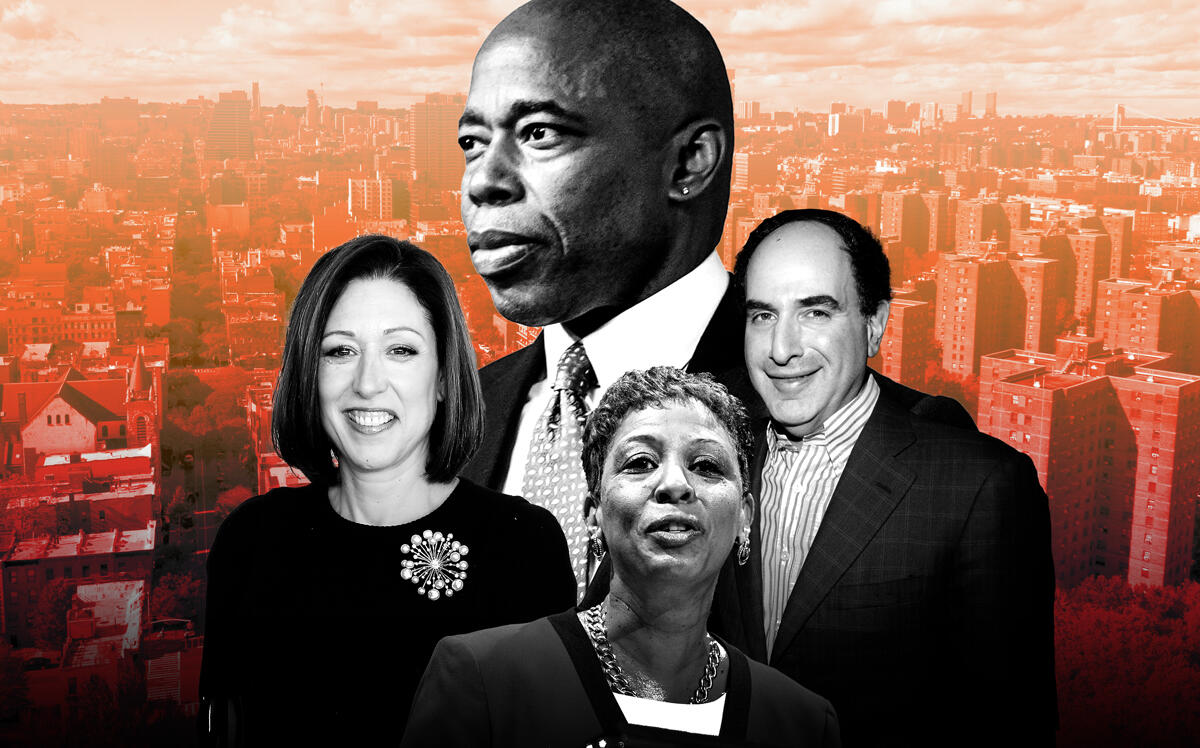We’re about to learn whether the two Adams regimes are serious about solving the city’s housing crisis.
In a drama that is riveting developers and housing advocates, a massive Harlem project will either be approved or left to die by Mayor Eric Adams and City Council Speaker Adrienne Adams in the next two weeks.
Much of the story sounds familiar: Developers have applied for zoning to build lots of apartments, along with some office and retail space. They need approval from the local Council person because of the custom called “member deference,” but negotiations are down to the wire, and if a deal is not reached by the inalterable deadline, the project will die.
As terrible as this process is (more on that below), developers and Council members usually come to terms at the 11th hour. What’s different about this project, called One45 for Harlem’s West 145th Street? Four crucial things:
-
- The developers, led by Bruce Teitelbaum, have offered to make a historically high 40 percent of the apartments affordable. Only six years ago, the City Council and de Blasio administration mandated 25 percent to 30 percent affordability for projects benefiting from rezoning. The idea was to create as much affordability as possible without getting none; developers lose money on every affordable unit, so if the city demands too much, projects don’t get built.
- The local Council member is self-described “radical” Kristin Richardson Jordan. She has demanded all of the apartments be affordable — and most of them deeply affordable. This might just be her opening offer, but given its absurdity and her deeming Teitelbaum’s counteroffer of 40 percent “a slap in the face,” it appears that her acceptable number is unworkable. Developers and contractors don’t work for free, investors don’t risk money for zero return (or worse), and lenders don’t finance unprofitable projects.
- On extremely rare occasions the City Council overrides a local member who is unreasonably blocking a project of citywide importance. But Jordan’s colleagues have said they will defer to her on One45, and first-year City Council Speaker Adrienne Adams has refused to get involved. This signals that for the rest of the speaker’s tenure, her members will have carte blanche to kill rezonings that are essential to ending the housing shortage.
- Mayor Eric Adams has also not lifted a finger for One45. On May 19, the same day he told throngs of cheering real estate people at The Real Deal’s packed event that the city should “roll out the red carpet” for development, Adams was asked about the Harlem project. He answered that Teitelbaum “doesn’t have to convince me, he has to convince the people on the ground.” So much for the red carpet. If the mayor won’t spend political capital or use his bully pulpit to rezone when projects are stopped by radical ideologues, his pro-housing spiel will be revealed as empty rhetoric, and developers will have little leverage in negotiations with Council members for the next eight years.
Taken together, these four facts mean the city is on the verge of not getting 915 desperately needed homes and, more importantly, setting a precedent that will cost it untold thousands more — all at a time when demand is increasing and driving rents up. No, the answer is not capping rents: That won’t stem demand. We need more housing so there’s not a bidding war for every decent listing.
The city’s rezoning process, virtually unchanged since I began covering it in 1992, makes sense to many folks: Developers get to build more than current zoning allows, and the local City Council members get to negotiate for what their constituents want — usually a smaller project with more affordable units than required by the Mandatory Inclusionary Housing law.
Read more



But it’s a bad policy for many reasons. The public review attracts mostly opponents, who browbeat the local Council member into shrinking or rejecting projects. Except for a few brave souls at pro-housing group Open New York, potential beneficiaries of new housing don’t testify at hearings because they are spread across the city and are not directly affected by any individual project.
Sometimes, no deal is reached and projects get canceled or built as-of-right with no affordable housing. Fortis’ redevelopment of Long Island College Hospital is an example; then-Council member Brad Lander asked for too much and got nothing.
Improving the process would cost Suri Kasirer, a veteran lobbyist and Teitelbaum’s wife, a lot of money because fewer developers would have to hire her to navigate it. I bet both Kasirer and Teitelbaum would make that sacrifice. The city needs housing more than lobbyists need fees.
In any case, spot rezonings should not be needed for scores of projects every year. The city should proactively rezone far more areas so developers can skip the expensive, time-consuming gauntlet that crowds out smaller builders. In a housing crisis, we need all hands on deck.
The de Blasio administration rezoned eight neighborhoods in eight years, seven fewer than planned, because it couldn’t find allies in the City Council. Speaker Adams just came out with her housing plan Sunday. It consists entirely of more subsidy. No mention of rezoning. No mention of member deference.
News flash: Subsidy alone won’t end the housing crunch. The problem is way too big and subsidies don’t buy much housing in high-income neighborhoods, where development sites are expensive.
During his campaign, Mayor Adams was all for building housing. He still is. But so far he has done nothing — for One45 or any other project. His Department of City Planning is taking the same approach to rezoning as the de Blasio administration did: looking (hoping?) for allies in the City Council. It’s short-term and incremental, the equivalent of begging on a street corner instead of applying for jobs.
We’re told that a housing plan and rezonings are coming. A plan is necessary but not sufficient; the city needs advocacy and leadership from its mayor. Polls consistently show that New Yorkers want more housing, but the Nimbyists and socialists yell the loudest. Adams must activate the pro-housing sentiment and marshall it.
Speaker Adams has to get out of her subsidy-only mindset and bring her 50 members along. Brooklyn member Crystal Hudson has shown that she can move beyond skepticism of developers and plan for more housing.
The jury is still out on her Harlem counterpart, Jordan. But a verdict is imminent. If she does abandon her conviction that no market-rate housing should be built in Harlem, New Yorkers will be sentenced to high housing costs for many years to come.
